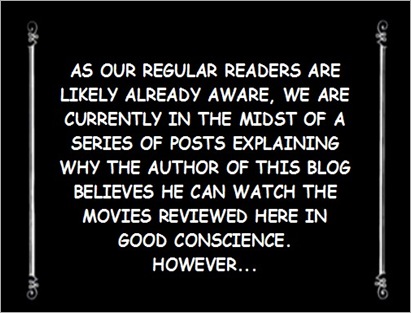
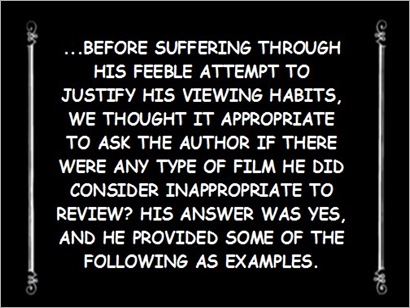
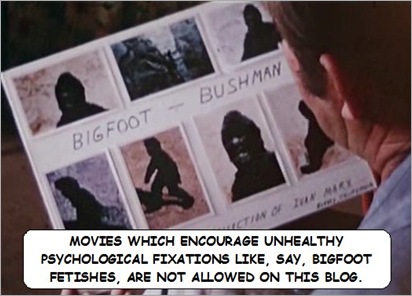
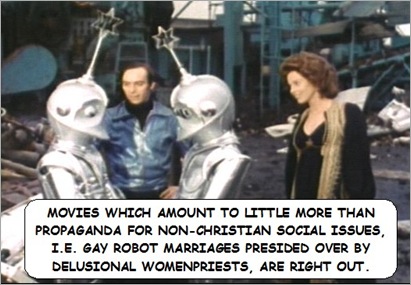
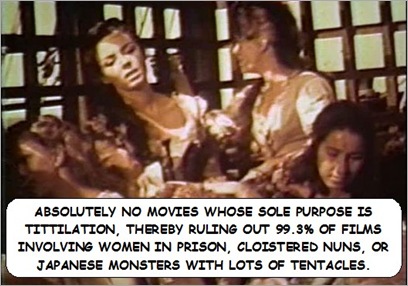



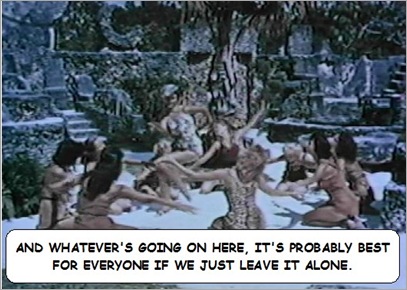

Shall we play a game? Anyone who has spent some time browsing around the Internet Movie Database knows you can search for movies based on plot keywords. Say, for instance, you recognize my avatar over there to the right, but can’t quite put your finger on the title of the movie it comes from. All you have to do is go to IMDB, type ‘killer doll’ into the search engine, and there in the list of 15 or so movies tagged with that keyword you’ll see the 1975 classic Trilogy Of Terror and exclaim, “That’s it!”
So what I’m going to do is provide some of the plot keywords to 10 movies and see not only if you can guess the titles, but also what they all share in common. The title fonts are in black, so to reveal the answer you’ll have to highlight the text.
Plot Keywords: Beheading, Heresy, Child Murder
Movie Title: The Gospel According To Saint Matthew (1964)
Plot Keywords: Dead Boy, Genocide, Female Nudity
Movie Title: The Mission (1986)
Plot Keywords: Corruption, Pet Killed, Hit With Baseball Bat
Movie Title: On the Waterfront (1954)
Plot Keywords: Torture, Dehuminization, Urination
Movie Title: Schindler's List (1993)
Plot Keywords: Adultery, Suicide, Prostitute
Movie Title: 8 1/2 (1963)
Plot Keywords: Sadism, Drunkeness, Physical Abuse
Movie Title: La Strada (1956)
Plot Keywords: Science Runs Amok, Stabbing, Erotic Dance
Movie Title: Metropolis (1927)
Plot Keywords: Sexual Predator, Undead, Lust
Movie Title: Nosferatu (1922)
Plot Keywords: Psychedelic Image, Murder, Asphyxiation In Space
Movie Title: 2001: A Space Odyssey (1968)
And last, but certainly not least…
Plot Keywords: Person On Fire, Melting Woman, Animal Attack, Narcotic Sleep, Crushed To Death, Witchcraft, and more
Movie Title: The Wizard of Oz (1939)
Now if you’re like me, the first thing you’re probably wondering is why the heck some of these terms are popular enough to be included in the keyword search list in the first place? Melting Woman? Asphyxiation In Space? Urination!?! I don’t even want to know why people are specifically searching for movies with urination in them! Really, don’t tell me.
But the second thing you’re probably wanting to know is what exactly do all of these films have in common? Well, believe it or not, these movies are among the 45 works selected by The Vatican in 1995 as some of the most important films of all time. How is that possible considering some of the obviously questionable content? Commenting on the list, Steven Greydanus of The Decent Films Guide says “it doesn’t confine itself to films that totally avoid such content - any more than the Church’s patronage of other art forms has historically eschewed depictions of violence and nudity. Nudity, sexual content, obscene and profane language, and explicit violence can all be found in films on the list… In recognizing the merits of these particular films, the commission did not endorse everything these films contain, or gave them any kind of imprimatur or blanket ecclesiastical approval. Movies, like other works of culture, are seldom if ever perfect. Even with good or important ones, the viewer must be able to think critically and sort out the good from the bad.”
Now that doesn’t mean the selection committee had free reign. The Vatican was careful to set some boundaries on how to discern which movies containing scenes of sex and violence (and yes, even wee wee) were worthwhile for inclusion while others were not. Of prime importance was each movie’s treatment and presentation of the subject matter. As Pope John Paul II noted, “Some cinema productions merit criticism and disapproval, even severe criticism and disapproval. This is the case when films distort the truth, oppress genuine freedom, or show scenes of sex and violence offensive to human dignity.” That’s why, as Greydanus points out, D. W. Griffith’s Intolerance made the list, while his groundbreaking The Birth Of A Nation, did not. The latter is arguably the better movie from a technical standpoint, but it’s glorification of the KKK is simply morally unacceptable.
Guess where I’m going with this?
For those of us for whom movies represent our primary form of entertainment, understanding where the boundaries are is doubly important. This is because, let’s face it, not every movie is one of “the most important films of all time.” Honestly, sometimes the stuff we watch around here barely qualifies as films at all. We always have to be vigilant that we’re not getting caught up in entertainment which crosses the line indicated by Pope John Paul II. And with that in mind, we’re finally zeroing in on the question which started this whole cycle of posts in the first place. Do the movies reviewed on this blog, which contain many of the same questionable plot elements as the movies above, but absolutely none of the artistry, still manage to stay within the boundaries dictated by conscience?
I sure hope so. But that’s for another post.
Good evening Mr. & Mrs. Catholic, and all you other Christians at sea. Our year long track through Scripture continues (using The Coming Home Network’s guide to reading the Bible and the Catechism in a year), and once again we’ve run across an odd little detail in the narrative. It might fall under the radar of big blogs, but we’ve got the scoop. Now off to press.
DATELINE: EXODUS CHAPTER 4
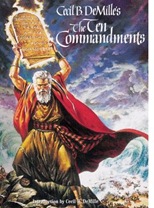 You know the story; you probably watch it on TV every Easter. Baby Moses gets plucked out of the Nile, grows up and flees Egypt, talks to God in the burning bush, heads back to Egypt to put the smack down on Yul Brynner, receives the Ten Commandments, and so on. But in between all those big set pieces there are brief interludes which add color to the story. Take this little transition, for instance, which occurs right after Moses has received instructions from God to return to Egypt and free the Jews. After the first day’s long journey, he and his family stop for a rest and… “At a lodging place on the way the LORD met him and sought to kill him. Then Zipporah took a flint and cut off her son's foreskin, and touched Moses' feet with it, and said, "Surely you are a bridegroom of blood to me!" So he let him alone. Then it was that she said, "You are a bridegroom of blood," because of the circumcision.” What the…!!!
You know the story; you probably watch it on TV every Easter. Baby Moses gets plucked out of the Nile, grows up and flees Egypt, talks to God in the burning bush, heads back to Egypt to put the smack down on Yul Brynner, receives the Ten Commandments, and so on. But in between all those big set pieces there are brief interludes which add color to the story. Take this little transition, for instance, which occurs right after Moses has received instructions from God to return to Egypt and free the Jews. After the first day’s long journey, he and his family stop for a rest and… “At a lodging place on the way the LORD met him and sought to kill him. Then Zipporah took a flint and cut off her son's foreskin, and touched Moses' feet with it, and said, "Surely you are a bridegroom of blood to me!" So he let him alone. Then it was that she said, "You are a bridegroom of blood," because of the circumcision.” What the…!!!
Did God just bust through a door and try to pop a cap in somebody!?! And did He really call off the hit just because Zipporah whipped out a SmartKlamp and smeared the results of the  procedure on Moses’ foot? Heck if we know. Dr. Scott M. Langston, in his book Exodus Through the Centuries, implies that an authoritative interpretation of this passage isn’t even possible because there just isn’t enough information. In fact, he seems to believe that an individual’s interpretation might be influenced more by personal baggage rather than hard facts. “The passage is enigmatic and has generated questions throughout the generations… While the original author/editor did not clearly indicate the significance of the incident, the reader’s context has profoundly influenced its interpretation.” To prove his point, the good doctor offers up pages full of differing theories from various experts across the ages, including these:
procedure on Moses’ foot? Heck if we know. Dr. Scott M. Langston, in his book Exodus Through the Centuries, implies that an authoritative interpretation of this passage isn’t even possible because there just isn’t enough information. In fact, he seems to believe that an individual’s interpretation might be influenced more by personal baggage rather than hard facts. “The passage is enigmatic and has generated questions throughout the generations… While the original author/editor did not clearly indicate the significance of the incident, the reader’s context has profoundly influenced its interpretation.” To prove his point, the good doctor offers up pages full of differing theories from various experts across the ages, including these:
A handful of rabbis in the Talmud suggest that Moses skipped circumcising his son at the prescribed time for fear the coming long journey would bring medical complications. God’s ‘attack’, however, emphasized the fact that a good Jew shouldn’t break the rules of the covenant under any circumstances.
Saint Augustine carried this argument forward to support the necessity for the baptizing of infants since, in Christian theology, baptism represents the new circumcision.
Some modern scholars have tossed around the idea that this event never happened, but is a parable used to explain how a rite once performed at puberty was transferred to infants by the Jews.
And a few really modern scholars have decided this story represents the subjugation of women by showing how the pagan Zipporah is forced by her cruel domineering husband and his male God to abandon her own beliefs and perform a man-centered Jewish ritual.
All this goes to show is that, in the absence of explicit detail, a Jew reading this passage will likely find something Jewish, a Christian will find something Christian, a secularist will try to find something  secular, and a radical feminist will find the plot to next week’s Lifetime original movie. And that’s okay, at least from the Christian’s viewpoint. As the Catechism points out, we purposely “read the Scripture within "the living Tradition of the whole Church… [Being] especially attentive "to the content and unity of the whole Scripture". Different as the books which compose it may be, Scripture is a unity by reason of the unity of God's plan, of which Christ Jesus is the center and heart.” So as long as we find some truth in our interpretation which doesn’t contradict existing dogma, we’re fine.
secular, and a radical feminist will find the plot to next week’s Lifetime original movie. And that’s okay, at least from the Christian’s viewpoint. As the Catechism points out, we purposely “read the Scripture within "the living Tradition of the whole Church… [Being] especially attentive "to the content and unity of the whole Scripture". Different as the books which compose it may be, Scripture is a unity by reason of the unity of God's plan, of which Christ Jesus is the center and heart.” So as long as we find some truth in our interpretation which doesn’t contradict existing dogma, we’re fine.
This method works even if the interpretation is kind of out there. Saint Gregory of Nyssa read this passage and somehow decided this interlude with Moses and Zipporah represented a coming together of secular philosophy and Jewish/Christian teaching where the latter “circumcised” the impurities from the former. (He’s a Saint, so we’re not going to argue.) Dr. Langston suggests that with this interpretation, odd though it is, “Gregory encourages Christians to pursue such a union, but with prudence.” As long as the proper boundaries are maintained, it can be a beneficial thing for everyone involved if Christians recognize the good to be found in non-Christian efforts while still addressing them through the lens of the Church’s viewpoint.
Some wacky Christians might even think it’s possible to do just such a thing with low budget popular entertainment. With the proper boundaries, of course.
But considering the length of this post, addressing those boundaries might best be saved for another time. For now, we close as we always do here at the Newsreel with the words of the great Les Nessman. “Good evening, and may the good news be yours.”
Work is slowing down for a few days (or possibly for a few years, but who’s counting), so I can manage a little blogging this week. Our feature presentation this time around is The Video Dead, another one of those old 1980s direct-to-video opuses which used to clutter the shelves of pre-Blockbuster mom and pop video stores. For those of you too young to remember a world before digital, this short should give you an idea of the hazards we old VHS junkies used to face when dealing with video tape. Talk about being consumed by what you watch. Considering the potential dangers, both physical and spiritual, it’s enough to make a person wonder why we Christians bother with movies at all.
Well, one of the main reasons is that movies (when they aren’t trying to kill us) are just plain fun and relaxing, a fact that hasn’t gone unnoticed by the Church. “Recreation, in its manifold varieties, has become a necessity for people who work under the fatiguing conditions of modern industry” Pope Pius XI wrote in his 1936 Encyclical Vigilanti Cura" (On Motion Pictures), noting that “the motion picture has become the most popular form of diversion which is offered for the leisure hours not only of the rich but of all classes of society.” Of course, as amply illustrated by Recorded Live, some films are potentially bad for you, so Pius XII ended his Encyclical with a call for the Bishops to keep an eye on things. “It will be necessary that in each country the Bishops set up a permanent national reviewing office in order to be able to promote good motion pictures, classify the others, and bring this judgment to the knowledge of priests and faithful.” So if you’ve ever wondered why the USCCB got into the business of reviewing and rating movies in the first place, look no further than Pope Pius XI.
Gone, however, are the days when the average Catholic in the pew was asked to take a pledge to avoid any movie deemed morally offensive by the Bishops. The USCCB’s Office for Film and Broadcasting instead offers this. “Our aim is to provide the public with a Catholic evaluation of both entertainment features and documentaries from a moral and artistic perspective… Our classifications have always been intended as a guide for parents to aid them in choosing what is most appropriate for their children, and for adult viewers who wish to make informed viewing decisions in an increasingly confusing media environment. How readers ultimately apply these classifications is a matter of personal choice, and our opinion of a film’s artistic worth is necessarily subjective… Parents must be the ultimate arbiters in evaluating their child’s emotional, spiritual and moral development, and the appropriateness of any given film. Thoughtful adults are the best judges of their own tastes and values.”
So there does not appear to be an outright obligation on the part of Catholics to avoid movies which the Bishops have deemed worthy of the big “O” (O–MORALLY OFFENSIVE), movies like, say, Motel Hell or Prince of Darkness. That’s a relief. At least I don’t have to take my Netflix queue list with me the next time I go to confession. But just because there’s no definitive THOU SHALT NOT WATCH stamped on the cover of any particular film, does that mean we should bother watching them, even in the name of simple recreation? How does someone like me, in good conscience, justify the time spent with something like Impulse?
Stay tuned. Lots of navel gazing to come in the days to follow.
One of my fine readers, germangreek, poses a question that, quite frankly, I expected to get a lot sooner than now.
"Finally, brothers, whatever is true, whatever is noble, whatever is right, whatever is pure, whatever is lovely, whatever is admirable—if anything is excellent or praiseworthy—think about such things." Phil 4:8, read at Mass last Sunday. I hate to be a wet blanket, because I really get a kick out of this blog of yours, but I really have to wonder if even one of the movies you've featured would meet St. Paul's rather stringent criteria. Unless, of course, the whole genre of B Movies has its own kind of perfection which these movies flawlessly achieve.
It’s a good question which I think deserves more than a soundbite in response. Of course, given my particular eccentricities, I feel compelled to do so by writing a movie review. While I’m working on my response I’d love to hear some comments from all of you out there on this topic.
The incomparable Goldentusk, ladies and gentlemen, absolutely one of our favorite finds on YouTube. All of his movie themes are great, but we’re particularly fond of this one. Not only does he manage to recap the entire plot of Halloween, but he also manages to throw in one of the better critical theories regarding what the character of Michael Myers represents. Plus he’s just darned funny.
Of course, the fact that we’re showing a Halloween video means it must be that season of the year. That's right. It's time, once again, for the annual Hallowed Be His Name Fall Festivals at your finer protestant churches! And just like last year, we here at The B-Movie Catechism are offering up five wardrobe suggestions based on some of the classic movies we've reviewed this past year sure to make you the hit of the harvest. We provide this service for anyone looking for unique costume ideas, but primarily for those who want to indulge in some cosplay but are hesitant due to the King James Version’s probable mistranslation of 1 Thessalonians 5:22 which reads "abstain from every appearance of evil". That verse in particular is one of the primary things which has led many of our protestant pals to cast a wary eye on some of the customs of Halloween. But rather than quibble over whether or not the more accurate translations of “abstain from every form of evil” or “avoid every kind of evil” actually leaves the door open for wearing that Heath Ledger Joker outfit this year, we here at The B-Movie Catechism would rather just go ahead and give you some costume ideas which are guaranteed 100% eeeevil free. Let’s get started.
 Hey kids, grab those old quads out of the attic and feather your hair, and you too can become a card carrying member of the the ROLLER BOOGIE tribe! Now we know that most people (rightfully) associate disco with snorting cocaine and having anonymous unfulfilling sex with polyester clad strangers, but that’s only true for the landlocked dancers. Once the skates are strapped on, it’s a whole different story. All you’ll feel the need for is speed. You might be hell on wheels, but just like Terry and Bobby and the rest of the gang, you’ll still be one clean teen.
Hey kids, grab those old quads out of the attic and feather your hair, and you too can become a card carrying member of the the ROLLER BOOGIE tribe! Now we know that most people (rightfully) associate disco with snorting cocaine and having anonymous unfulfilling sex with polyester clad strangers, but that’s only true for the landlocked dancers. Once the skates are strapped on, it’s a whole different story. All you’ll feel the need for is speed. You might be hell on wheels, but just like Terry and Bobby and the rest of the gang, you’ll still be one clean teen.
 If you’ve been wondering what to do with that old faux fur PETA splattered red paint on, then wonder no more. Just combine it with some dollar store swords and axes and you’re ready to hit the town as part of that pair of happily married scourges of evil, Ator and Sunya from ATOR: THE FIGHTING EAGLE. As an added trick, after you’ve gotten your treats of course, whichever one of you is Ator can lean over and give Sunya a big smooch and blurt out, “Hey, have you guys met my sister?” (Warning: Trick not as shocking in Alabama.)
If you’ve been wondering what to do with that old faux fur PETA splattered red paint on, then wonder no more. Just combine it with some dollar store swords and axes and you’re ready to hit the town as part of that pair of happily married scourges of evil, Ator and Sunya from ATOR: THE FIGHTING EAGLE. As an added trick, after you’ve gotten your treats of course, whichever one of you is Ator can lean over and give Sunya a big smooch and blurt out, “Hey, have you guys met my sister?” (Warning: Trick not as shocking in Alabama.)
 We know that the standard issue Dickies spacewear worn by the crew of the good ship DARKSTAR isn’t all that interesting, so forget about it. Instead, the apparel of choice from this film belongs to the everyone’s favorite little beach ball alien. All that’s required for this costume is one of those orange department of correction trash bags and a pair of rubber gloves. Trick them out with some yellow polka dot accents and you’re ready to innocently wreak havoc on the neighborhood. Like our extraterrestrial pal, however, don’t purposely destroy anything (like, say, the whole planet). That way you’ll make sure you’re only culpable for the consequences of your actions and not the intent.
We know that the standard issue Dickies spacewear worn by the crew of the good ship DARKSTAR isn’t all that interesting, so forget about it. Instead, the apparel of choice from this film belongs to the everyone’s favorite little beach ball alien. All that’s required for this costume is one of those orange department of correction trash bags and a pair of rubber gloves. Trick them out with some yellow polka dot accents and you’re ready to innocently wreak havoc on the neighborhood. Like our extraterrestrial pal, however, don’t purposely destroy anything (like, say, the whole planet). That way you’ll make sure you’re only culpable for the consequences of your actions and not the intent.
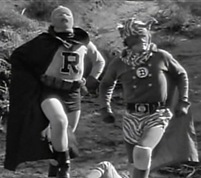 If RAT PFINK AND BOO BOO can make their costumes out of stuff they found at the laundromat, then so can you. If you don’t want to be saddled with the moral ambiguity of Batman and are willing to accept about 0.000001% of the budget, then this is the superhero get-up for you. Sure, you’ll miss out on having wonderful toys like a batmobile, bat-cave, batarang, bat-etc. But in exchange you’ll get clarity of conscience and a chance to hang out with Kogar the swingin' ape. Money can’t buy you that.
If RAT PFINK AND BOO BOO can make their costumes out of stuff they found at the laundromat, then so can you. If you don’t want to be saddled with the moral ambiguity of Batman and are willing to accept about 0.000001% of the budget, then this is the superhero get-up for you. Sure, you’ll miss out on having wonderful toys like a batmobile, bat-cave, batarang, bat-etc. But in exchange you’ll get clarity of conscience and a chance to hang out with Kogar the swingin' ape. Money can’t buy you that.
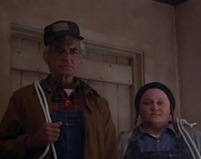 Vincent and Ida from MOTEL HELL. Admit it, if you don’t already own this ensemble, you at least know somebody you can borrow it from. Now these costumes may seem like an odd choice, as the Smith siblings tend to muddy up their religious beliefs with their homicidal tendencies. But we figure since Halloween only comes around once a year, why not let it all hang out and spend an evening being the kind of freakish irrational intolerant violence-mongering freakshow that asshats like Bill Maher think you are all year long anyway. When All Saints Day rolls around the next morning, you can go right back to saying prayers for Bill and all the other little boys who never got over having their knuckles rapped in Catholic school.
Vincent and Ida from MOTEL HELL. Admit it, if you don’t already own this ensemble, you at least know somebody you can borrow it from. Now these costumes may seem like an odd choice, as the Smith siblings tend to muddy up their religious beliefs with their homicidal tendencies. But we figure since Halloween only comes around once a year, why not let it all hang out and spend an evening being the kind of freakish irrational intolerant violence-mongering freakshow that asshats like Bill Maher think you are all year long anyway. When All Saints Day rolls around the next morning, you can go right back to saying prayers for Bill and all the other little boys who never got over having their knuckles rapped in Catholic school.
Well, that’s about it for this year; hope we’ve been helpful. For more Halloween goodness be sure to head over to ChristianHalloweenFan run by Lint Hatcher, author of The Magic Eightball Test: A Christian Defense of Halloween and All Things Spooky. See you next year. Happy Happy Halloween everybody!
THE TAGLINE
“From a vast and different galaxy… A space adventure for all time!”
THE PLOT
It looks like the end of the road for Stella Star and Akton the Pathfinder, the galaxy’s most daring smugglers, when they are finally captured and sentenced to life working the radium furnace. But when Prince Simon goes missing while trying to locate the eeevil Count Zarth Arn’s Doom Machine, The Emperor of the First Circle of the Universe releases the scoundrels into the custody of Chief Thor and the android Elle so they can pilot the rescue mission. Searching amongst uncharted planets, the band of heroes run afoul of some space amazons and their giant guardian before getting abandoned on an ice planet by the traitorous Thor. Thanks to the “not quite dead yet” Akton, however, the group manages to escape and make its way to the Count’s hidden world where they finally locate the Prince. Unfortunately, Zarth Arn, aware of their coming, activates the planet’s self destruct mechanism. Things look hopeless as the seconds tick off and Akton dies (for real) fighting The Count’s robot golems. Fortunately Simon’s father arrives and uses his authority as the Emperor to freeze time, allowing the gang to escape. Knowing Zarth Arn believes them to be dead, our heroes launch a surprise attack on his doomsday fortress, only to be repelled by The Count’s superior forces. With time running out, The Emperor convinces Stella to pilot his own ultimate weapon of last resort, the unstoppable Starcrash.
THE POINT
There’s no getting around it, the first thing you notice while watching Starcrash is just how hard it really, really tries to be Star Wars. Enormous space cruisers slowly creeping across the starfields, idiosyncratic robots, caped villains with planet destroying weapons, cocky anti-heroes carrying contraband on their starship, light sabers. Oh yeah, they’ve got freaking light sabers in this movie! But even with all that, the second thing you notice while watching Starcrash is just how spectacularly it fails to be Star Wars. The starfields… are Christmas lights. The robot… inexplicably speaks with a Texas drawl. The doomsday weapon… is a lego-esque hand shaped construction which clenches into a fist when enemies approach. The galaxy’s greatest smugglers consist of… former child evangelist Marjoe Gortner sporting an afro and genre vet Caroline Munro wearing an assortment of Barbarella style star-kinis. And those light sabers… well, actually, they’re just light sabers. But they’re those store brand knock-offs us poor kids had to settle for instead of the real Kenner versions that made the cool whoosh sound when you swung them! In fact, forget the good ones, some of us didn’t even get one of those crummy inflatable light sabers Lucas rushed into stores right after the first movie came out! (Sob!) Thank you, thank you Starcrash, for dredging up my old childhood scars!
But I digress. And really the comparison isn’t fair because director Luigi Cozzi never wanted to incorporate elements of Star Wars into Starcrash in the first place. In a 2004 interview he stated that, inspired by the success of the disaster movies of the 1970s, he had scripted a treatment for a similar movie set in space. “It was about a gigantic spaceship for passengers. It's the first trip to Saturn… To see the shores of the rings. When crossing the rings, the ship hurts a space iceberg and then crashes on Titan, a moon of Saturn. So there's only a few survivors who try to wait for the rescue party who is coming… [But] nobody was interested. When I proposed it to Nathan Wachsberger, he was not interested. He called me back after Star Wars opened in America. He tells me "Luigi, I want... not your story... I want Star Wars!".” So, you see, it’s kind of hard to fault Cozzi for his halfhearted attempt at a Star Wars ripoff because what he really wanted to make instead was a Poseidon Adventure ripoff.
Besides being forced to make a different movie than he wanted, Cozzi was faced with an even bigger problem. Star Wars hadn’t been released in Italy yet so nobody had actually seen the thing. How do you ripoff something when you don’t even know what it is? Fortunately, by sheer luck, the avid sci-fi reader Cozzi had actually picked up the novelization of Star Wars as a whim just a few weeks earlier, so he was able to at least get the gist of the story and lift (as noted above) certain identifiable images from Lucas’ movie. To make it enjoyable for himself, however, Cozzi decided to throw in bits and pieces from his favorite fantasy movies. “It was what I wanted to do. But people didn't understand that. They didn't know anything about Forbidden Planet or about Ray Harryhausen's movies… or anything like that… [Starcrash] was very much like a Robert Heinlein's juvenile from the fifties. I love those things. And so I made something similar in my way. I put Barbarella in it. Cause I love Barbarella. I also did use novels of A. E. Van Vogt as a model… As a basis for the whole story I did pick up a book by a science-fiction writer called The Secret Of Sinharat.” So, unable to make a Poseidon Adventure ripoff, and not quite able to make a true Star Wars ripoff, Cozzi instead made a ripoff of every other genre movie he’d watched over the last twenty years.
With all that source material haphazardly thrown together, you might be tempted to think it would be a difficult task to mesh it all into anything resembling a coherent story. Well, for Cozzi and his crew, it wasn’t difficult at all. It was, in fact, flat out impossible. Even more than the homemade effects and nods to older movies, it’s the writing which really makes Starcrash such a treat to the bad movie aficionado. Rarely will you find a script which so utterly fails to make any sense whatsoever. Why have Stella instigate a jail break which apparently results in the fiery death of all her fellow prisoners, only to have her sentence commuted by the nonchalant authorities as she exits the burning wreckage. How can you have a character stop the flow of time, yet still have every person in the room look around and, unaffected, simply walk out. And someone please explain why, in the final confrontation with The Death Glove, don’t our heroes just fire their ship’s lasers? Couldn’t that enormous glowing brain which powers their ship have told them that lasers would be much more effective than shooting hollow torpedoes containing live soldiers through the glass of the space station’s bridge? An act, by the way, which explicably fails to cause the ship’s atmosphere, or anything else for that matter, to be sucked out into space! Somewhere, about two thirds of the way through Starcrash, you simply give up on making sense out of the whole thing and begin basking in the sheer Dadaistic weirdness of it all.
But topping even the near endless gaps in logic, the crowning achievement of Starcrash’s script has to be in its unrivaled use of Deus Ex Machina. Now as you probably already know, the term Deus Ex Machina refers to the plot device in which a complicated or hopeless situation is resolved through the introduction of something not previously mentioned anywhere in the story, something the writer basically pulls out of his… er, out of thin air. Starcrash is THE master class of this technique. Trapped on an ice planet with the temperature dropping 1000 degrees below zero? No problemo, your handy robot will suddenly tell you that, by the way, he happens to be equipped with the ability to lower your body temperature to match, with absolutely no resulting physical or mental damage. Your navigator killed and your ship stolen? No biggie, your navigator will reveal his lifelong ability to see into the future, a talent he never got around to mentioning all those decades you’ve known each other, which somehow allows him to be… not really killed so he can come back and get you. Trapped on a planet armed to explode in 30 seconds? S’alright, your new boyfriend’s dad can waltz in and demand the flow of time to be halted, a power granted to him because he’s Emperor. (And here you thought papal infallibility was a cool job perk.) And best of all, after the eeevil Count has defeated all of your forces, the Emperor will suddenly remember that he has a secret doomsday machine of his own which will allow the good guys to basically drop a city on whomever they choose. Of course, the whole point of a doomsday machine is lost, IF you keep it a secret! WHY didn't the Emperor tell the world, eh? Isn’t it just a wee bit possible Zarth Arn might have reconsidered his whole “taking over the galaxy” scheme if he had known someone could just drop a city on him at any time?
Still, when all is said and done, the use of Deus Ex Machina in Starcrash is so sublimely ridiculous that it’s hard to hold it against the movie. In more serious literature, however, condemnation for this kind of contrivance goes all the way back to antiquity. The Roman poet Horace (last seen in Limbo according to Dante) wrote in his work Ars Poetica, “If you would have your play deserve success, give it five acts complete; nor more, nor less; Nor let a god in person stand displayed, Unless the labouring plot deserve his aid.” What Horace was singling out in particular was the practice of certain Greek playwrights to write their characters into an inescapable corner, only to have a god (deus) literally descend from the heavens (by means of a crane, or machina) and make everything hunky dory. Horace, and countless critics who followed him, felt these “acts of god” were basically a dirty cheat, betraying both the audience and the story itself. If you’ve followed characters all the way through a story and they’ve been making decisions which have led them to a bad end, you don’t just write in a miracle rescue which erases all of the negative consequences and forces a happy ending. According to the critics, it’s best to let the solution to the crisis, if there is one, come through the actions of the protagonists. After all, as Benjamin Franklin put it, the Lord helps those who help themselves.
The problem with all that is twofold. First is the fact that anyone who has actually read the Bible probably recognizes that Ben wasn’t quoting Scripture, he was instead paraphrasing Aesop’s 6th century B.C. fable Hercules and the Waggoner. While the Bible is indeed full of exhortations to personal responsibility like the well-known “anyone unwilling to work should not eat”, the totality of Scripture is pretty clear that no matter how much effort we put into things, in the end, we are to leave the outcome of everything to God. As the Catechism puts it, “With creation, God does not abandon his creatures to themselves. He not only gives them being and existence, but also, and at every moment, upholds and sustains them in being, enables them to act and brings them to their final end. Recognizing this utter dependence with respect to the Creator is a source of wisdom and freedom, of joy and confidence.” The second thing is that along with this ‘utter dependence’ on God comes the simple fact that all of us Christians are actually supposed to believe in miracles, those things the Catholic Encyclopedia describes as “wonders performed by supernatural power as signs of some special mission or gift and explicitly ascribed to God… the wonder of the miracle is due to the fact that its cause is hidden, and an effect is expected other than what actually takes place.” When you combine these two things, the idea of relying on a Deus Ex Machina to pull your fat out of the fire doesn’t seem like too much of a stretch.
And yet, more often than not, it seems like the Deus Ex Machina never shows up in real life. For example, during those times when I’ve felt like dropping a city on someone was the only possible way to extricate myself out of a jam (surprisingly more times than you might think), nobody has shown up and offered me the means to do so. Either God is not doling out enough miracles, or perhaps there’s something more to depending on our creator than just counting on him to (dare I say it) bail us out every time something goes wrong. And of course there is, as long as we accept the premise that God knows what He’s doing. “Believing in God is inseparable from believing in His Providence.” said Cardinal Christoph Schonborn in a Lenten retreat meditation given to Pope John Paul II and the papal household. (Preaching to the Pope; no pressure there.) “Believing in God the Creator is possible only if he is believed in also as ‘governor and provider’ of his creation. Now ruling and guiding means: leading something to its goal. God leads creation to its goal, to its fulfillment: to the Kingdom of God, to the ‘Church universal in the presence of the Father’”. Which is swell, but doesn’t explain why God’s plan doesn’t include saving us every time we get in a pickle.
“God is the sovereign master of his plan.” the Catechism confirms, “But to carry it out he also makes use of his creatures' co-operation... For God grants his creatures not only their existence, but also the dignity of acting on their own, of being causes and principles for each other, and thus of co-operating in the accomplishment of his plan.” And when, acting on our own, we end up in a terrible situation, sometimes God actually does provide a miracle, a Deus Ex Machina if you will, to help us out (which is another long post for another day). But other times, when we mess things up, it somehow fits the overall plan to let the consequences play out. God “permits it… because he respects the freedom of his creatures and, mysteriously, knows how to derive good from it… In time we can discover that God in his almighty providence can bring a good from the consequences of an evil, even a moral evil, caused by his creatures.” That is our utter dependence on God, not that things will always turn out the way we want, but rather that things will turn out the way they’re supposed to so that, when all is finally said and done, the ultimate goal is achieved. It’s beautiful, really, if you take the time to contemplate it, and it brings some comfort during those times when the “big save” doesn’t look like it’s coming.
It takes time and practice to develop that attitude, though. I’d be less than honest if I said there weren’t still times when my first response is, “Boy, this situation would turn out great if someone would just drop a city on that guy.” I’m working on it.
THE STINGER
This is where I usually say a few last words, but I'm not even going to try and compete with Plummer. Ladies and gentlemen, The Emperor of the First Circle of the Universe...